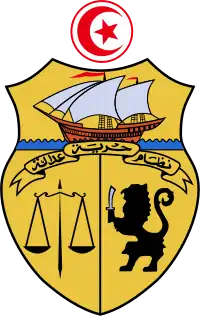Assembly of the Representatives of the People
The Assembly of the People's Representatives (Arabic: مجلس نواب الشعب Majlis Nuwwāb ash-Sha‘b, French: Assemblée des représentants du peuple; ARP) is Tunisia's legislative branch of government. The unicameral Assembly replaced the Constituent Assembly and was first elected on 26 October 2014.[1] The legislature consists of 217 seats.[2] Before the 2011 revolution, Tunisia's parliament was bicameral and consisted of an upper chamber called the Chamber of Advisors and a lower chamber called the Chamber of Deputies.
Assembly of the People's Representatives مجلس نواب الشعب Majlis Nuwwāb esh-Sha‘b | |
|---|---|
| 2nd legislature | |
 | |
| Type | |
| Type | Unicameral
(formerly bicameral) |
| History | |
| Preceded by | Constituent Assembly of Tunisia |
New session started | 13 November 2019 |
| Elections | |
| Party-list proportional representation using multi-member constituencies | |
Last election | 6 October 2019 |
| Meeting place | |
 | |
| Bardo Palace, Le Bardo (near Tunis) | |
| Website | |
| www | |
Tunisia's electoral law requires "vertical gender parity", i.e. male and female candidates must alternate within each party's regional list of candidates. Consequently, as of 2015, 68 of the chamber's members are women, the highest proportion of female legislative representatives in the Arab world.[3]
The current speaker of the Assembly is Rached Ghannouchi, who was elected on 13 November 2019.[4]
Elections
The first elections to the Assembly were held on 26 October 2014, slightly under four years since the conclusion of the Tunisian Revolution, and slightly under three years since the election to the Constituent Assembly. Nidaa Tounes gained a plurality of votes, winning 85 seats in the 217-seat parliament, beating the Ennahda Movement (69 seats) and many smaller parties.
2019 Election
The second elections to the Assembly were held on 6 October 2019.
Suspension of Parliament on 25 July 2021
On 25 July 2021, in light of violent demonstrations against the government demanding the improvement of basic services and amid a growing COVID-19 outbreak, Saied suspended parliament for thirty days and waiving the immunity of the parliament members and ordering the military to close the parliament house.
On 24 August 2021, Saied extended the suspension of parliament, although the constitution states the parliament can only be suspended for a month, raising concerns in some quarters about the future of democracy in the country. There is currently no constitutional court in Tunisia to offer jurisdiction in his interpretation of the constitution.
On 22 September, Sadie announced that he will rule by decree and ignore parts of the constitution.
On 13 December 2021, Saied extended the suspension of the parliament until a new election takes place, and announced a nationwide public consultation that would take place from 1 January until 20 March 2022 to gather suggestions for constitutional and other reforms after which Saied would appoint a committee of experts to draft a new constitution, to be ready by June ahead of the referendum that will take place on 25 July 2022. He said that new parliamentary elections will be held on 17 December 2022, after going through the referendum and preparing a new electoral system.[5]
Dissolution on 30 March 2022
On 30 March 2022 president Saied ordered the formal dissolution of the Assembly, in order to "preserve the state and its institutions". Some hours before, parliamentarians held a plenary session online and voted through a bill against Saied's "exceptional measures".[6]
Current affiliations
| Affiliation | Members | ||
|---|---|---|---|
| 2019 election results |
As of February 2020 | ||
| Ennahda Movement | 52 | ||
| Heart of Tunisia | 38 | ||
| Democratic Current | 22 | ||
| Dignity Coalition | 21 | 19 | |
| Free Destourian Party | 17 | ||
| People's Movement | 15 | ||
| Tahya Tounes | 14 | ||
| Machrouu Tounes | 4 | ||
| Errahma | 4 | 2 | |
| Republican People's Union | 3 | ||
| Tunisian Alternative | 3 | ||
| Nidaa Tounes | 3 | ||
| Afek Tounes | 2 | ||
| Popular Front | 1 | ||
| Aïch Tounsi | 1 | ||
| Farmers' Voice Party | 1 | ||
| Green League | 1 | ||
| Current of Love | 1 | ||
| Democratic and Social Union (VDS-PR-MDS) | 1 | ||
| Socialist Destourian Party | 1 | ||
| Independent | 12 | ||
| Dissidents | 4 | ||
| Total members | 217 | ||
References
- "Tunisian elections intensify focus on alliances". Al Monitor. 14 September 2014. Retrieved 19 October 2014.
- "Tunisia begins landmark election race". AFP. 4 October 2014. Retrieved 19 October 2014.
- "Tunisia". freedomhouse.org. 21 January 2015.
- "Tunisia parliament elects Ennahda's Rachid Ghannouchi as speaker". Al Jazeera. 13 November 2019. Retrieved 13 November 2019.
- "Tunisian president announces constitutional referendum in 2022".
- "Tunisia's president dissolves parliament, extending power grab".